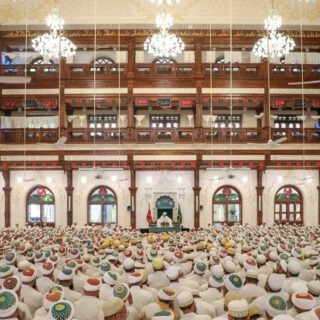Prayer is the contemplation of life from the highest point of view. Prayer brings one close to Allah Ta´aala, the Creator of the universe. One of the most intimate forms of prayer in which a devotee engages in a personal dialogue with Allah is ‘munaajaat’. Verses of munaajaat composed by AwliyaullahAS, especially Amirul Mumineen Moulana AliSA and Moulana Imam Ali Zain al-AbideenSA are a powerful means of intercession for the fulfillment of desires.
The 51st Dai, Syedna Taher SaifuddinRA would compose a munaajaat every year on Lailatul Qadr and bestow on Mumineen the opportunity to join him in his intimate prayers to Allah. The 52nd Dai, Syedna Mohammed BurhanuddinRA continued his revered father’s tradition. Maula’s munaajaat chronicled contemporary events of Dawat and reflected events happening around the world that affected Mumineen. By reciting the munaajaat, Mumineen joined Maula in his contemplation of life, about matters of temporal and spiritual importance; and got a glimpse into his concerns and his hopes; his objectives and his ambitions for Dawat and the children of Dawat.
In the same manner, his mansoos, the 53rd Dai Mutlaq, Syedna Aali Qadr Mufaddal SaifuddinTUS composed a munaajaat this Shehre Ramadan and bestowed upon every mumin the privilege of reciting it in Lailatul Qadr. Recitation of his munaajaat enlightens the soul and mind, leads to the fulfillment of desires, redemption from sins and betterment in the quality of life.
It is indeed befitting that Maula’sTUS very first munaajaat should begin with Bismillah: the most sublime of all beginnings. His each word is a reminiscence of Syedna Mohammed BurhanuddinRA which culminates in a verse in which he describes the plight of Mumineen at the loss of their beloved Dai. He says, “The destitute of the Madinah of Dawat and their children cry aloud with anguish, ‘Oh Maula! Where did you go?’”. An allusion to the children of Madinah who would stand outside their houses in anticipation of Moulana Imam Ali Zain al-AbideenAS , asking when will he come?
Syedna Aali Qadr Mufaddal SaifuddinTUS seeks the intercession of the Panjatan in the very manner in which Syedna Mohammed BurhanuddinRA sought, indicating that every act of his will be an attempt to emulate his predecessor and his appointer. While describing the virtues of Moulatona FatemaSA, Aqa MaulaTUS highlights the lofty meanings and signs contained in her deed of preparing rotis with her own hands, emphasizing that making roti is not a trivial task.
Among the many things that MaulaTUS seeks for Mumineen in his munaajaat are ease of difficulty, earning of a halal livelihood, protection from haram, forbearance in obedience and that Allah accept Mumineen’s deeds of namaaz, zakaat and rozah. MaulaTUS prays for the protection of the Holy Sites that are under threat and that may peace prevail on earth. Aqa Maula’sTUS earnest desire to see a haafiz al-Quran in every house finds expression in his prayers when he says, “(O Allah,) Provide succour for the one who endeavours to memorise the Quran so that he can memorise it in its entirety and draw good into his house through its recitation.” MaulaTUS also prays for the return of those who have been led astray from Haqq.
The munaajaat is replete with prayer for the betterment of Mumineen and at the same time it also calls them towards those deeds that will ensure their betterment. The word “Dai” has two meanings: ‘the one who calls towards something,’ and ‘the one who supplicates.’ These two meanings and these two tasks blend together seamlessly and become one in munaajaat.








